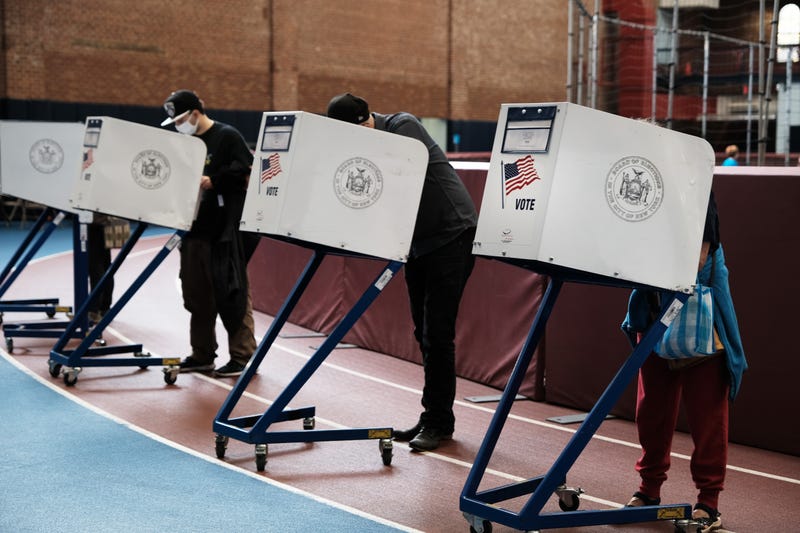
NEW YORK (1010 WINS) – There are five proposals on New York City ballots for the 2021 Election, impacting everything from the political redistricting process to absentee voting eligibility and environmental rights.

When voters head to the polls on Nov. 2, or vote early or by mail, they’ll be able to have their say on the following five issues. Here's some background on the propositions to help you decide.
CLICK HERE for full New York Election results.
Proposal 1: Amending the Apportionment and Redistricting Process
The first measure is perhaps the most complicated—and controversial. It would make sweeping changes to the state’s redistricting process, which determines the districts for Congress and the state Legislature (Senate and Assembly). These districts are currently being redrawn based on the 2020 census.
There are four parts to the proposal, all of which are outlined below.
• (1) Changes to the redistricting schedule
Currently, the Independent Redistricting Commission, which redraws the districts and submits draft political maps to state lawmakers, will be required to submit its first plan to the Legislature by Jan. 15, 2022. The proposal would move that deadline up to Jan. 1, 2022—and then to Nov. 15 starting in 2031—now that the state’s primary elections are being held in June instead of September.
• (2) Freezing the number of state senators
The proposal would amend the New York State Constitution to freeze the number of state senators/districts at 63. Currently, new Senate districts can be added via the redistricting process to the benefit of political parties.
• (3) Changes to the process of counting for the census
The proposal would amend the state constitution with new requirements for how people are counted in the census for redistricting purposes. It would require that prisoners be counted at their last home address instead of their place of incarceration. It would also require that every person living in the state be counted as part of the total population, regardless of their citizenship status.
• (4) Changes to the Independent Redistricting Commission
Before outlining these changes, here is some background on the redistricting process in the state:
• Redistricting is done by the Independent Redistricting Commission, which is comprised of 10 members. The 10 members are made up of four Democrats, four Republicans and two members who are not aligned with either party. The four Democrats and four Republicans are appointed by the majority and minority leaders of the state Senate and Assembly. The commission also includes two co-executive directors; currently, one is required to be a registered Democrat and one a registered Republican.
• To approve a redistricting plan, seven members of the 10-person commission must vote to support it—and at least one of these members must be from the opposing political party. Once the plan is approved, it’s sent to the state Legislature, which gives the final approval. The number of votes in the Legislature that are required to pass the plan depends on whether one party controls the Legislature or if it’s divided. Currently, the Democrats control both chambers, the Senate and the Assembly.
Under the proposal, the state constitution would be amended so that seven members of the commission can approve a redistricting plan—regardless of who appointed them—meaning one member wouldn't have to be from the opposing political party, as is required currently.
Additionally, under the proposal, approval of the commission’s plan by the state Legislature would only require a simple majority in each chamber, regardless of which party controls the chamber. Under current law, since the Democrats control both chambers, a redistricting plan is required to get a two-thirds majority vote.
Furthermore, the proposal would allow the commission to appoint the two co-executive directors—currently required to be one Democrat and one Republican—regardless of their political party and with a simple majority vote.
Proposal 2: Right to Clean Air, Clean Water, and a Healthful Environment
This measure would amend Article 1 of the state constitution to establish “the right of each person to clean air and water and a healthful environment.”
The state constitution currently provides some protection for natural resources but doesn’t include an enforceable right to clean water, clean air or a healthy environment for New Yorkers.
If the proposal passes, it would require lawmakers to consider the impact of clean air, clean water and a healthy environment in decision-making. It would also allow residents to sue if they believe their rights to these have been violated.
Proposal 3: Same-Day Voter Registration
This proposition would eliminate the requirement in the state constitution that a voter must be registered to vote at least 10 days before an election to cast a ballot.
If this passes, an amendment would get rid of the requirement and give the state Legislature the ability to pass new laws allowing New Yorkers more time to register to vote, including on Election Day.
Proposal 4: No-Excuse Absentee Voting
This proposal would give New Yorkers greater flexibility to vote absentee. While voters in the state are temporarily eligible to vote by mail due to the risk of COVID-19, this amendment to the state’s constitution would expand that eligibility.
Currently, voters must affirm they’ll be out of town on Election Day, or that they’re ill or physically disabled, in order to vote by mail. If this proposal passes, it’d give the state Legislature the power to pass new laws that would give all New York voters the option to vote by mail without providing an excuse.
Proposal 5: Jurisdiction of the New York City Civil Court
The final proposal on the ballot would allow the New York City Civil Court to hear and decide claims of up to $50,000, instead of the current limit of $25,000.
As it stands, only the New York State Supreme Court can hear and decide claims over $25,000. This proposal would amend the state’s constitution to allow city civil court judges to hear and decide claims of up to $50,000, with the aim of addressing a backlog of cases that has grown during the pandemic.


